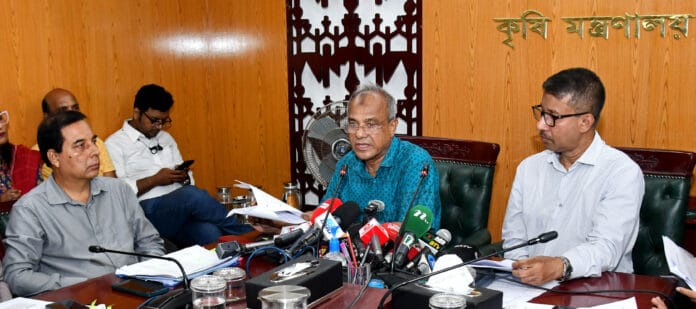Agriculture Lieutenant General (Retd.) Md. Jahangir Alam Chowdhury has declared that no arable land will be allowed to be destroyed under any circumstances.
He stressed that construction on double- and triple-crop farmland will be strictly prohibited, as the government is finalizing a new ordinance on land use and agricultural land protection with tough provisions.
Speaking at a press conference at the Ministry of Agriculture on Thursday, Chowdhury outlined the ministry’s achievements during the past year of the interim government formed after the July uprising. Agriculture Secretary Dr. Md. Emdad Ullah Mian and senior officials were present.
He said Tk 893.20 crore in incentives, including fertilizer, seeds, and saplings, had been distributed to nearly nine million small and marginal farmers. During FY2024–25, total rice production reached over 419 lakh metric tons, while significant harvests were also achieved in potatoes, maize, wheat, onions, garlic, and chilies.
Chowdhury, also home affairs adviser, noted that Tk 27,684.97 crore in fertilizer payments had been cleared, including long-standing arrears of Tk 20,691 crore.
Bangladesh also secured 30,000 metric tons of fertilizer free of cost from Russia. Breaking fertilizer import syndicates saved the government Tk 233.61 crore, while an updated distribution policy is in its final stage.
Unused jute mill warehouses are being converted into storage facilities, and the International Islamic Trade Finance Corporation has already signed a $100 million loan agreement to support fertilizer imports.
Chowdhury said 100 mini cold storages are being built for vegetables, with specialized facilities for onions and potatoes. The government has fixed the cold-storage gate price of potatoes at Tk 22 per kg and will purchase 50,000 tons directly from farmers.
On exports, he reported a 10% rise in earnings over the past year. Bangladesh exported mangoes to China for the first time and shipped more than 62,000 tons of potatoes. A treatment plant for export crops is under construction in Gabtoli, and Good Agricultural Practices protocols for 15 crops have been approved.
Environmental measures include phasing out akashmoni and eucalyptus plantations and distributing 3.3 million indigenous saplings free of cost. A long-term Agriculture Development Roadmap 2025–2050 is being prepared to ensure sustainable farming and food security.
Chowdhury also highlighted digital reforms, including the “Khamari” mobile app to provide farmers with real-time agricultural data and a digitized seed management system. He said 109 deprived officials had been promoted, 19 punished, 645 transferred, and over 100 corruption cases referred to the Anti-Corruption Commission. Several state institutions have also been renamed to remove links with the former regime.
“We are determined to safeguard farmland and ensure sustainable agriculture as the backbone of food security and national growth,” the adviser said.

